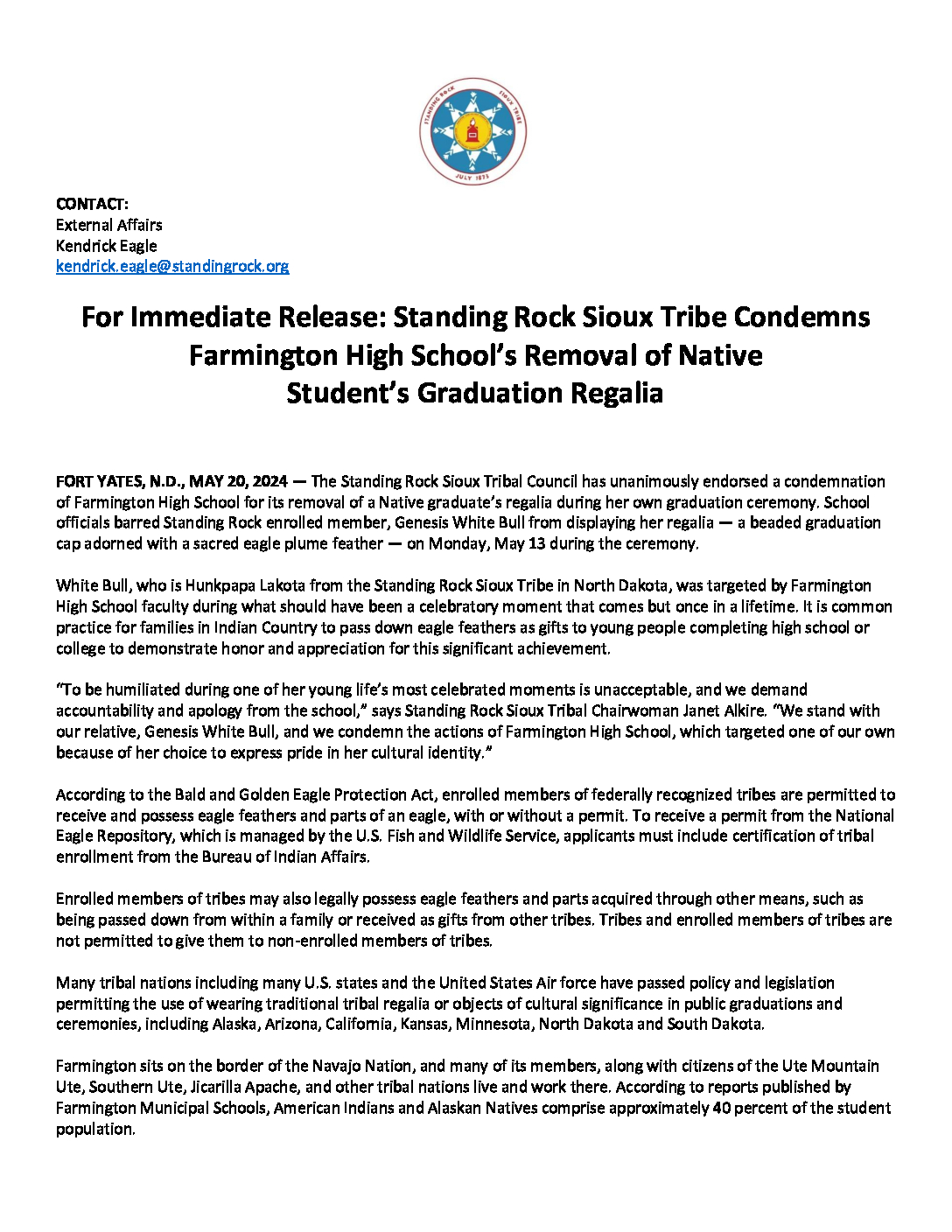PSA: Standing Rock Sioux Tribe Condemns Farmington High School’s Removal of Native Student’s Graduation Regalia
CONTACT:
External Affairs
Kendrick Eagle
kendrick.eagle@standingrock.org
For Immediate Release: Standing Rock Sioux Tribe Condemns Farmington High School’s Removal of Native Student’s Graduation Regalia
FORT YATES, N.D., MAY 20, 2024 — The Standing Rock Sioux Tribal Council has unanimously endorsed a condemnation of Farmington High School for its removal of a Native graduate’s regalia during her own graduation ceremony. School officials barred Standing Rock enrolled member, Genesis White Bull from displaying her regalia — a beaded graduation cap adorned with a sacred eagle plume feather — on Monday, May 13 during the ceremony.
White Bull, who is Hunkpapa Lakota from the Standing Rock Sioux Tribe in North Dakota, was targeted by Farmington High School faculty during what should have been a celebratory moment that comes but once in a lifetime. It is common practice for families in Indian Country to pass down eagle feathers as gifts to young people completing high school or college to demonstrate honor and appreciation for this significant achievement.
“To be humiliated during one of her young life’s most celebrated moments is unacceptable, and we demand accountability and apology from the school,” says Standing Rock Sioux Tribal Chairwoman Janet Alkire. “We stand with our relative, Genesis White Bull, and we condemn the actions of Farmington High School, which targeted one of our own because of her choice to express pride in her cultural identity.”
According to the Bald and Golden Eagle Protection Act, enrolled members of federally recognized tribes are permitted to receive and possess eagle feathers and parts of an eagle, with or without a permit. To receive a permit from the National Eagle Repository, which is managed by the U.S. Fish and Wildlife Service, applicants must include certification of tribal enrollment from the Bureau of Indian Affairs.
Enrolled members of tribes may also legally possess eagle feathers and parts acquired through other means, such as being passed down from within a family or received as gifts from other tribes. Tribes and enrolled members of tribes are not permitted to give them to non-enrolled members of tribes.
Many tribal nations including many U.S. states and the United States Air force have passed policy and legislation permitting the use of wearing traditional tribal regalia or objects of cultural significance in public graduations and ceremonies, including Alaska, Arizona, California, Kansas, Minnesota, North Dakota and South Dakota.
Farmington sits on the border of the Navajo Nation, and many of its members, along with citizens of the Ute Mountain Ute, Southern Ute, Jicarilla Apache, and other tribal nations live and work there. According to reports published by Farmington Municipal Schools, American Indians and Alaskan Natives comprise approximately 40 percent of the student population.
Local Native people say that In the past, celebration of cultural identity has often been well supported in Farmington’s schools. External communications from Farmington Municipal Schools after Monday’s graduation said it was committed to exploring options to allow cultural elements in student attire, including graduation caps and gowns.
About the Standing Rock Sioux Tribe
Straddling the South Dakota and North Dakota border, the Standing Rock Indian Reservation covers 2.3 million acres, stretching across endless prairie plains, rolling hills and buttes that border the Missouri River. Home to the Lakota and Dakota nations, the Standing Rock Sioux Tribe is committed to protecting the language, culture and well-being of its people through economic development, technology advancement, community engagement and education. In 2016 and 2017, Standing Rock gained international attention when tens of thousands of allies came to protest camps to oppose the Dakota Access pipeline, which continues to threaten the Tribe’s sole source of fresh drinking water in Lake Oahe and the Missouri River which Standing Rock government continues the fight to this day. Follow the Standing Rock Sioux Tribe on Facebook.




